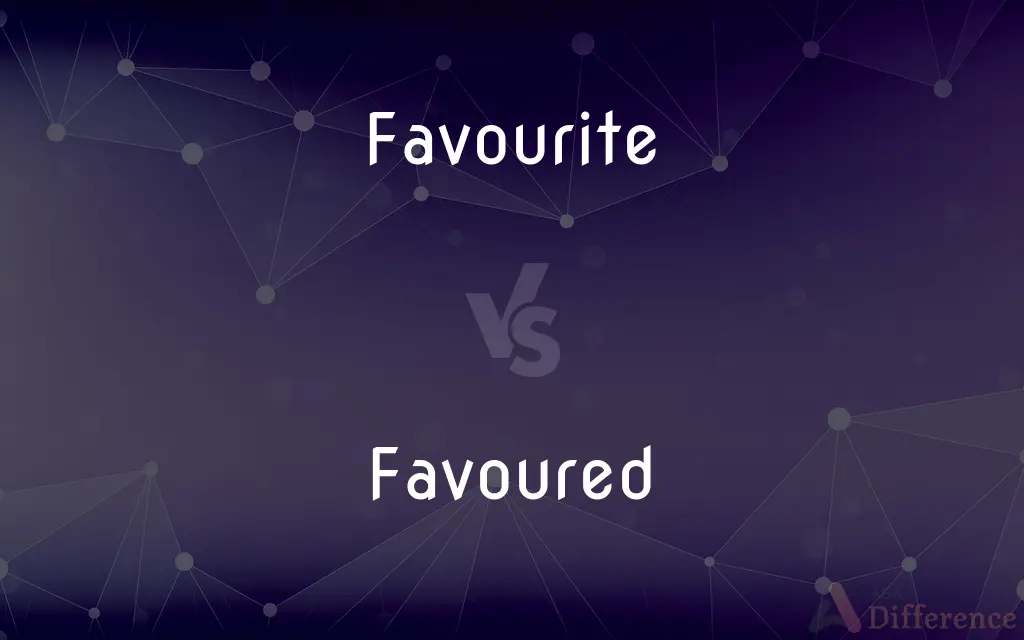Favourite vs. Favoured — What's the Difference?
Edited by Tayyaba Rehman — By Maham Liaqat — Updated on March 24, 2024
"Favourite" denotes something or someone most loved or preferred, while "favoured" means provided with advantages or preferential treatment.

Difference Between Favourite and Favoured
Table of Contents
ADVERTISEMENT
Key Differences
"Favourite" is a term used to describe a person, place, thing, or idea that is preferred above all others in a particular context or situation. It implies a level of esteem, affection, or preference that sets the subject apart from its counterparts. For example, in the sentence "Ice cream is my favourite dessert," the speaker indicates a personal preference for ice cream over other desserts. On the other hand, "favoured" refers to something or someone that receives special support, advantages, or preferential treatment. It can imply bias or a deliberate choice to benefit something or someone over others, as in "The policy favoured domestic producers over importers."
While "favourite" often reflects personal choice or taste and can apply to a wide range of categories, including food, music, hobbies, or even people, "favoured" is more about the circumstances or conditions that give someone or something a particular advantage. For instance, a "favoured" nation in trade agreements receives specific benefits that are not extended to others.
The distinction also extends to the action involved; "favourite" is about personal preference and emotional connection, while "favoured" involves an action or condition that results in a biased advantage. For example, saying "She is the teacher's favourite" suggests a preference based on affection or merit, while "She is favoured by the teacher" might imply she receives special treatment, regardless of merit.
In terms of usage, "favourite" can be a noun or an adjective, as in "That song is my favourite" (adjective) or "That song is a favourite of mine" (noun). "Favoured," however, is primarily used as an adjective to describe someone or something that is the recipient of favoritism or advantage, as in "He is among the favoured candidates for the job."
Understanding the difference between these terms helps clarify the nature of the preference or advantage being discussed, whether it is based on personal choice and affection ("favourite") or on external conditions that confer benefits ("favoured").
ADVERTISEMENT
Comparison Chart
Definition
Preferred above all others; most loved.
Given special advantage or preferential treatment.
Context
Reflects personal preference or taste.
Implies bias or advantage given by external factors.
Usage
Can be a noun or an adjective.
Primarily used as an adjective.
Example Sentence
"Chocolate is my favourite flavour."
"She was favoured in the inheritance."
Emotional Connection
Often implies an emotional or qualitative preference.
Suggests an advantage not necessarily related to personal preference.
Compare with Definitions
Favourite
Expresses Affection or Esteem.
My dog is my favourite companion.
Favoured
Implies Advantage.
The favoured team won the match.
Favourite
Used as Noun or Adjective.
She is a favourite author of mine.
Favoured
Specific Context of Advantage.
The location is favoured due to its climate.
Favourite
Personal Choice.
My favourite hobby is painting.
Favoured
Condition of Being Preferred.
The project was favoured by the committee.
Favourite
Indicates Preference.
Blue is my favourite color.
Favoured
Outcome of Preference.
Favoured applicants will receive early consideration.
Favourite
Wide Range of Applications.
His favourite subject is history.
Favoured
External Bias.
The policy favoured younger applicants.
Favourite
A favourite (British) or favorite (American English) was the intimate companion of a ruler or other important person. In post-classical and early-modern Europe, among other times and places, the term was used of individuals delegated significant political power by a ruler.
Favoured
Treated or regarded with partiality.
Favourite
Preferred or liked above all others unless qualified.
This is my second favourite occupation.
Favoured
(in combination) Having a certain appearance or physical features.
Ill-favoured; well-favoured; hard-favoured
Favourite
Belonging to a category whose members are all preferred or liked over nonmembers.
I just saw a movie with all my favourite actors in it.
Favoured
(dated) Wearing a favour.
A white-favoured footman
Favourite
A person or thing who enjoys special regard or favour.
The teacher's favourite always went first.
Favoured
Simple past tense and past participle of favour
Favourite
A person who is preferred or trusted above all others.
Favourite
A contestant or competitor thought most likely to win.
You were my favourite to win the spelling competition.
She's the favourite, she'll probably be elected.
Favourite
(internet) A bookmark in a web browser.
Favourite
(in the plural) A short curl dangling over the temples, fashionable in the reign of Charles II.
Favourite
To favour.
Favourite
(Internet) To bookmark.
Favourite
(Internet) To add to one's list of favourite items on a website that allows users to compile such lists.
Favourite
A competitor thought likely to win
Favourite
A special loved one
Favourite
Something regarded with special favor or liking;
That book is one of my favorites
Favourite
Appealing to the general public;
A favorite tourist attraction
Favourite
Preferred above all others and treated with partiality;
The favored child
Common Curiosities
What makes something a "favourite"?
A "favourite" is something that is preferred or loved more than others due to personal taste or affection.
Is "favourite" always positive?
Typically, yes, as it denotes preference or affection. However, its usage can be subjective and context-dependent.
Can "favoured" imply unfairness?
Sometimes, especially if the preferential treatment is perceived as unjust or not based on merit.
Can an object be "favoured"?
Yes, if it is given preference or advantages in specific situations, such as a "favoured" tool or method.
Can a person be "favoured"?
Yes, a person can be "favoured" if they receive special advantages or preferential treatment in a particular context.
Do "favourite" and "favoured" have the same root?
Yes, both stem from the concept of favor, but they diverge in their application and connotations.
Are "favourite" and "favoured" interchangeable in any context?
No, because they convey different meanings: one is about personal preference, and the other is about receiving an advantage.
How do I know if I should use "favourite" or "favoured"?
Use "favourite" when expressing a personal preference or affection, and "favoured" when referring to something given an advantage or preference by external factors.
Is it possible to be a "favourite" without being "favoured"?
Yes, one can be a favourite (preferred for personal reasons) without necessarily receiving any external advantages or special treatment.
How do cultural differences impact the use of "favourite" vs. "favoured"?
Cultural norms and values can influence what is considered a "favourite" or how "favoured" treatment is perceived, especially in terms of fairness and merit.
Share Your Discovery

Previous Comparison
Transfiguration vs. Transformation
Next Comparison
Anger vs. BitternessAuthor Spotlight
Written by
Maham LiaqatEdited by
Tayyaba RehmanTayyaba Rehman is a distinguished writer, currently serving as a primary contributor to askdifference.com. As a researcher in semantics and etymology, Tayyaba's passion for the complexity of languages and their distinctions has found a perfect home on the platform. Tayyaba delves into the intricacies of language, distinguishing between commonly confused words and phrases, thereby providing clarity for readers worldwide.
















































